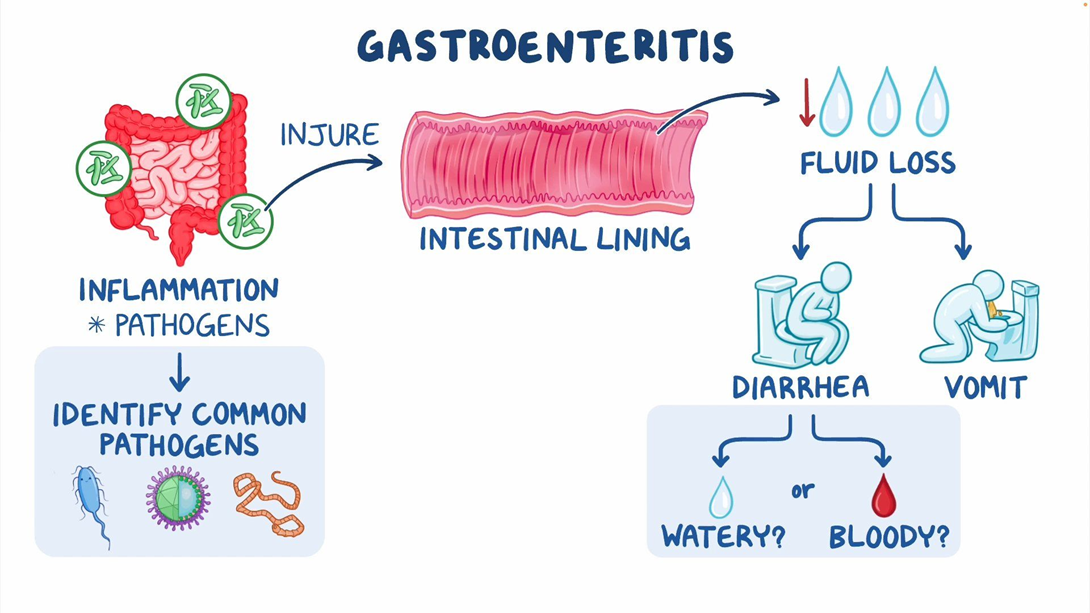A nurse in a clinic is caring for a client who has gastroenteritis. The nurse compares the client's condition from two days ago and today. Which of the following changes should the nurse report to the provider?
The client is confused and appears weak.
The client's oral mucosa is dry and tongue is furrowed.
The client's lungs are clear bilaterally.
The client's abdomen is soft and nontender.
The Correct Answer is A
Choice A reason: Confusion and weakness are signs of dehydration and electrolyte imbalance, which can result from vomiting and diarrhea. These are serious complications that can affect the client's mental status, blood pressure, heart rate, and kidney function. The nurse should report these changes to the provider and monitor the client's vital signs and fluid status.
Choice B reason: Dry oral mucosa and furrowed tongue are also signs of dehydration, but they are less severe than confusion and weakness. The nurse should report these changes to the provider as well, but they are not the most urgent ones.
Choice C reason: Clear lungs bilaterally are a normal finding and do not indicate any change in the client's condition. The nurse should document this finding, but it does not require reporting to the provider.
Choice D reason: A soft and non-tender abdomen is a normal finding and does not indicate any change in the client's condition. The nurse should document this finding, but it does not require reporting to the provider.

Nursing Test Bank
Naxlex Comprehensive Predictor Exams
Related Questions
Correct Answer is D
Explanation
Choice A reason: Offering the client a selection of beverages at each meal is not a good action to include in the plan, as it may reduce the client's appetite and intake of solid foods. The nurse should limit the client's fluid intake before and during meals, and encourage the client to consume high-calorie and high-protein drinks, such as milkshakes or smoothies, after meals.
Choice B reason: Informing the client that a weight gain of 2.3 kg (5 lb) per week is expected is not a good action to include in the plan, as it may cause anxiety and resistance in the client. The nurse should set realistic and individualized weight goals for the client, and monitor the client's weight and vital signs regularly. The nurse should also avoid focusing on the client's weight, and instead emphasize the client's health and well-being.
Choice C reason: Arranging for someone to remain with the client for 30 min after meals is a good action to include in the plan, as it can prevent the client from purging or exercising excessively. The nurse should provide a supportive and nonjudgmental environment for the client, and supervise the client's eating and toileting behaviors. The nurse should also educate the client and the family about the complications and treatment of anorexia nervosa.
Choice D reason: Encouraging the client to participate in developing dietary goals is a good action to include in the plan, as it can increase the client's sense of control and motivation. The nurse should collaborate with the client, the dietitian, and the mental health team to create a personalized and flexible meal plan that meets the client's nutritional and psychological needs. The nurse should also praise the client for any progress or achievement, and reinforce the client's positive coping skills.

Correct Answer is C
Explanation
Choice C reason: Flushing the tubing with water after each feeding is important to prevent clogging, maintain patency, and clear any residual formula from the tube. It also helps to prevent bacterial growth and infection.
Choice A reason: Wearing sterile gloves during a feeding is not necessary, as enteral feedings are not considered sterile procedures. Clean gloves are sufficient to prevent contamination and protect the nurse and the client.
Choice B reason: Chilling the feeding prior to administering is not recommended, as cold formula can cause abdominal cramping, discomfort, and diarrhea. The formula should be at room temperature or slightly warmed before giving it to the client.
Choice D reason: Positioning the client upright prior to a feeding is correct, but it is not enough. The client should remain upright for at least 30 minutes after the feeding as well, to prevent aspiration, reflux, and nausea.
Whether you are a student looking to ace your exams or a practicing nurse seeking to enhance your expertise , our nursing education contents will empower you with the confidence and competence to make a difference in the lives of patients and become a respected leader in the healthcare field.
Visit Naxlex, invest in your future and unlock endless possibilities with our unparalleled nursing education contents today
Report Wrong Answer on the Current Question
Do you disagree with the answer? If yes, what is your expected answer? Explain.
Kindly be descriptive with the issue you are facing.
